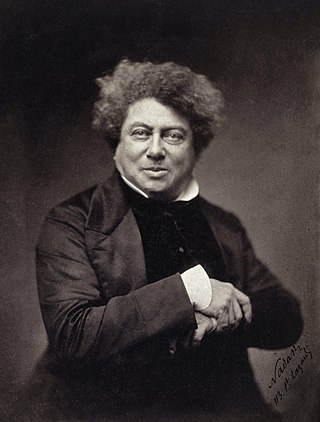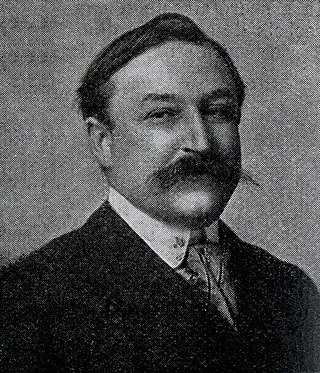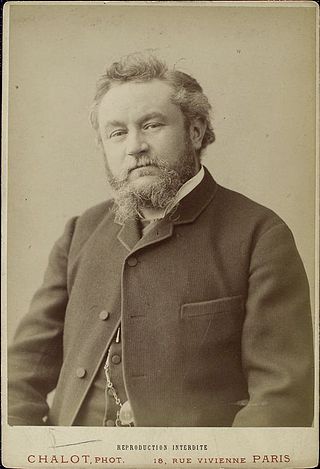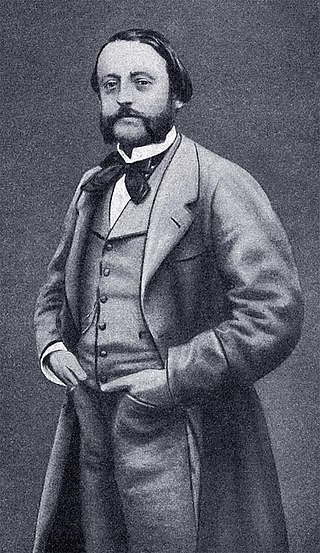Related Research Articles

Valentin Louis Georges Eugène Marcel Proust was a French novelist, literary critic, and essayist who wrote the monumental novel À la recherche du temps perdu which was published in seven volumes between 1913 and 1927. He is considered by critics and writers to be one of the most influential authors of the 20th century.

Honoré de Balzac was a French novelist and playwright. The novel sequence La Comédie humaine, which presents a panorama of post-Napoleonic French life, is generally viewed as his magnum opus.

Alexandre Dumas, 24 July 1802 – 5 December 1870), also known as Alexandre Dumas père, was a French novelist and playwright.

Paul Armand Silvestre was a 19th-century French poet and conteur born in Paris.

Auguste Maquet was a French author, best known as the chief collaborator of French novelist Alexandre Dumas, père, co-writing such works as The Count of Monte Cristo and The Three Musketeers.

Gaston Arman de Caillavet was a French playwright.

Paul Meurice was a French novelist and playwright best known for his friendship with Victor Hugo.

Le chevalier d’Harmental is an opéra comique in five acts of 1896, with music by André Messager and a French libretto by Paul Ferrier, after Dumas père and Auguste Maquet. The play of the 1843 novel – in five acts, a prologue and ten tableaux – was first performed on 16 July 1849 at the Théâtre-Historique in Paris. The opera was first performed at the Opéra Comique in Paris on 5 May 1896, but ran for only six performances. It was seen at the Vienna Hofoper during the 1896–97 season. The composer lamented that the failure of the work, which had preoccupied him for three years, hurt as he had attached great importance to it, and had put considerable effort into it; he was so discouraged that he did not want to compose, and wanted to go away to England. Messager's biographer Michel Augé-Laribé contends that the fault lay with the dull words, rather than the music, which he claims contains a prototype of the "style dialogué, juste, rapide, naturel, aisé", which will reach its height in the final works, and its beautifully coloured orchestration.

Émile Bergerat was a French poet, playwright and essayist. He used the pseudonyms l'Homme masqué, Caliban and Ariel. A library in Neuilly-sur-Seine opposite his flat bears his name.
Auguste Jean François Arnould was a French poet, playwright, historian, novelist and essayist of the first half of the 19th century.

Amédée de Jallais was a 19th-century French playwright, operetta librettist and chansonnier.
Adolphe Guénée was a 19th-century French playwright.
Félix Henri Duquesnel was a French journalist, playwright and novelist.
Jean Robiquet was a French art historian, art critic and curator. He was also a playwright and opérettes librettist known under the pseudonym Jean Roby.
Amedée Urbain Louis Henry Joseph Artus was a 19th-century French conductor and composer, author of more than eight hundred incidental music pieces.

Alexandre Artus was a 19th-century French conductor and composer.

Louis Jean Péricaud was a 19th-century French stage actor, chansonnier, playwright, theatre historian and theatre director.

Gervais Bernard Gaston Salvayre was a French composer and music critic who won the Prix de Rome for composition in 1872.

Charles Jean-Baptiste Jacquot, who wrote under the pen name Eugène de Mirecourt, was a French writer and journalist. The main critic of Alexandre Dumas, he contributed novels, short stories and biographies to the French literary life of the second half of the 19th century.

The Forty-Five Guardsmen is a historical novel by French writer Alexandre Dumas, written between 1847 and 1848 in collaboration with Auguste Maquet. Set in 1585 and 1586 during the French Wars of Religion, it is the third and final work in his Valois trilogy, concluding the events of La Reine Margot and La Dame de Monsoreau, and again featuring Chicot the Jester.
References
- ↑ Hemmings, F. W. J. (2011). Alexandre Dumas: The King of Romance. A&C Black. p. 115. ISBN 9781448204830.
- ↑ Dumas, Alexandre; Maquet, Auguste (1858). Le chevalier d'Harmental: Drame en cinq actes et dix tableaux, avec prologue (in French). N. Tresse.
- ↑ Stoullig E. Les Annales du Théâtre et de la Musique, 22eme edition, 1896. G Charpentier et Cie, Paris, 1897.
- ↑ Saintsbury, George (1891). Essays on French Novelists. C. Scribner's Sons. pp. 209–212.
- ↑ Stowe, Richard S. (1976). Alexandre Dumas (père) . Twayne Publishers. pp. 111. ISBN 9780805762303.
- ↑ Benjamin Taylor (27 October 2015). Proust: The Search. Yale University Press. p. 88. ISBN 978-0-300-16596-8.